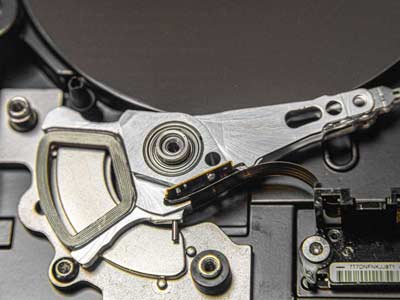Hard drive crashes are brutal. The results from them, however, can be fairly mixed. Have a computer that is backed up daily to a server? Heck, trash the hard drive if you like. If you have a recent backup, there really is no reason to stress. On the other hand, if you have no backup, you should probably understand right off the hop that recovering from a full loss of business data can be an incredible nightmare.
 Ask yourself this: how quickly would your company be able to recover if it suffered a full loss of all of its client, transaction, accounting, and tax information? Digital orders, receipts, marketing materials and videos… poof — all gone. We at Hard Drive Recovery Group hope this is not you, but if it is, we’re here, and if you currently don’t back up your hard drives, feel free to set something up over the next day. We’ll wait!
Ask yourself this: how quickly would your company be able to recover if it suffered a full loss of all of its client, transaction, accounting, and tax information? Digital orders, receipts, marketing materials and videos… poof — all gone. We at Hard Drive Recovery Group hope this is not you, but if it is, we’re here, and if you currently don’t back up your hard drives, feel free to set something up over the next day. We’ll wait!
Common Hard Drive Crash Causes
Lots of weather, electrical issues and other things can take your hard drive to failure. Additionally, there are the common human adversaries of software malfunctions, malware, viruses and cyber-attacks. If hackers manage to get past your virus protection, as they often do with ransomware, your last line of defense may in fact be to restore your system from a comprehensive backup of your data (again, if this is a physical crash, you don’t even have to worry about the previous drive – just replace it and you’re good).
Take our advice as a data recovery service with over 30 years in the business. Hard drives WILL inevitably fail. The question is always when. Here are some prime causes to look out for.
- Physical Hard Drive Damage From External Sources
Fire, water, and electricity are natural adversaries of your hard disk drive. Static electricity can cause shorts, and of course we all understand how well mechanical devices handle fire and water (they handle them by crashing, of course). For external hard drives, meanwhile, the shock of a fall or frankly any kind of hit to the case can often trigger hard drive crash.
- Hard drive crash due to mechanical failure (age, head misalignment, etc)
Any time a data-destroying head crash occurs on a spinning (spindle and platter) hard drive, the data is lost forever. Solid-state drives have the advantage of having no moving components, but they will ultimately wear down due to the heat generated and the amount of time they are used. The circuits themselves can wear down as well, as they are based on mechanical principles.
- Logical hard drive crash (your file system strikes back!)
Starting with the boot program and continuing through the process of launching software applications and retrieving data, your operating system software is dependent on its file management and retrieval system, which can be found working in a variety of locations on your hard drive.
— Hard Drive Recovery Group (@hdrecoverygroup) February 8, 2022
Consider the file structure of your computer’s operating system as an indexed database. Your operating system’s “base” can fail due to index corruption or missing links, and your operating system can fail due to this. The hard drive will be unable to access its own file retrieval system if its indexed database sustains damage. Lost links occur when a computer file loses track of the next piece of the file that is stored someplace else on the hard drive–this is known as “fragmentation” of the hard drive.
Either way, file corruption is one of the biggest causes of hard drive crash.
How to Protect Yourself Against Hard Drive Failure
Hard drives rarely fail without notice, unless they are affected by a catastrophic event. From things like the blue screen of death, to screen freezing to grinding sounds there are various warning indicators. Whatever the symptoms or causes, the most reliable insurance against data loss is an off-site data backup tool that will get your system back online as quickly as possible, no matter what the problem is. In fact, an external hard drive is always pretty great for this as well!
Recovering from a hard drive crash is often far easier than many folks think. Call Hard Drive Recovery Group today to discuss your hard drive recovery options!
